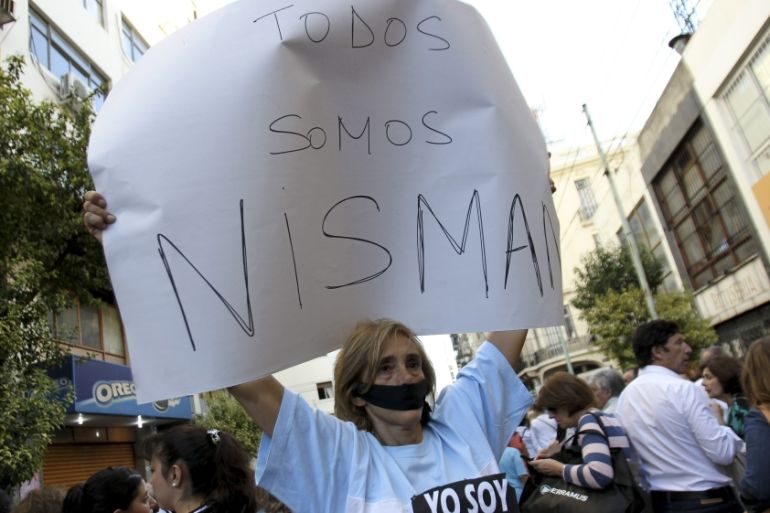Argentina’s president says prosecutor killed in plot
Argentine President Cristina Kirchner says prosecutor murdered to implicate her government in a cover-up.

Argentine President Cristina Kirchner has said she believes a prosecutor who died under suspicious circumstances was murdered in a plot to implicate her government in a cover-up of a 1994 bombing of a Jewish community centre.
Alberto Nisman, the lead prosecutor in the two-decade-old case, was found dead with a gunshot wound to the head in his home on Sunday – one day before he was to go before a congressional hearing to accuse Kirchner of shielding Iranian officials implicated in the attack, which left dozens dead.
Investigators have said Nisman appeared to have committed suicide, but have not ruled out homicide or an “induced suicide.”
In a post on her Facebook page on Thursday, Kirchner contended that Nisman was killed to immerse her government in scandal after he had been “used” to publicly accuse her of involvement in the cover-up, the AFP news agency reported.
“I’m convinced that it was not suicide,” Kirchner said.
“Prosecutor Nisman’s charges were never in themselves the true operation against the government. They collapsed early on. Nisman did not know it and probably never knew it.
It's very serious. To go from supporting the thesis of a suicide, to an assassination, she must assume the consequences
“The true operation against the government was the prosecutor’s death after accusing the president, her foreign minister, and the secretary-general of (her political faction) of covering up for the Iranians accused in the AMIA attack,” she said.
Kirchner did not say who she thought was behind Nisman’s death, but aides in recent days have pointed to former intelligence officials who were recently fired, including the former chief of operations of the Intelligence Secretariate, Antonio Stiusso, who worked closely with Nisman.
The mystery over Nisman’s death has only deepened since he was found in the bathroom of his 13th floor apartment, with a .22-caliber revolver beside his body.
Although it appeared to be a suicide, a test detected no powder residue on his hands. Nisman’s mother, Sara Garfunkel, who found the body, and his ex-wife have said they do not believe he committed suicide.
Viviana Fein, the prosecutor investigating his death, said it was still classified as “doubtful.”
Opposition criticism
Before his death, Nisman had filed a 280-page complaint charging that Kirchner had issued an “express directive” to shield a group of Iranian suspects in the bombing.
Nisman contended that the government had agreed to swap grain for oil with Tehran in exchange for withdrawing “red notices” to Interpol seeking the arrests of the former and current Iranian officials accused in the case.
He backed it up with information gleaned from intercepted telephone conversations and reports by two supposed intelligence agents, who the Intelligence Secretariat said did not work for them and dismissed as “influence peddlers.”
Opposition leaders denounced Kirchner’s charges as an opportunistic about-face.
“It’s very serious. To go from supporting the thesis of a suicide, to an assassination, she must assume the consequences,” said Senator Ernesto Sanz, a member of the opposition.
Deadly bombing
The attack on the Buenos Aires headquarters of the Argentine Jewish Mutual Association, or AMIA killed 84 people and injured more than 300 when a van loaded with explosives was detonated in front of the building.
Since 2006, Argentinian courts have demanded the extradition of eight Iranians, including former president Akbar Hashemi Rafsanjani, former defence minister Ahmad Vahidi and Iran’s former cultural attache in Buenos Aires, Mohsen Rabbani, for the bombing.
But in 2013, Kirchner signed a memorandum of understanding with Tehran agreeing to set up a “truth commission” to investigate the bombing and allowing Argentine prosecutors to question the suspects in Iran.
The rapprochement was vehemently opposed at the time by Jewish community leaders, who charged it was “unconstitutional.”